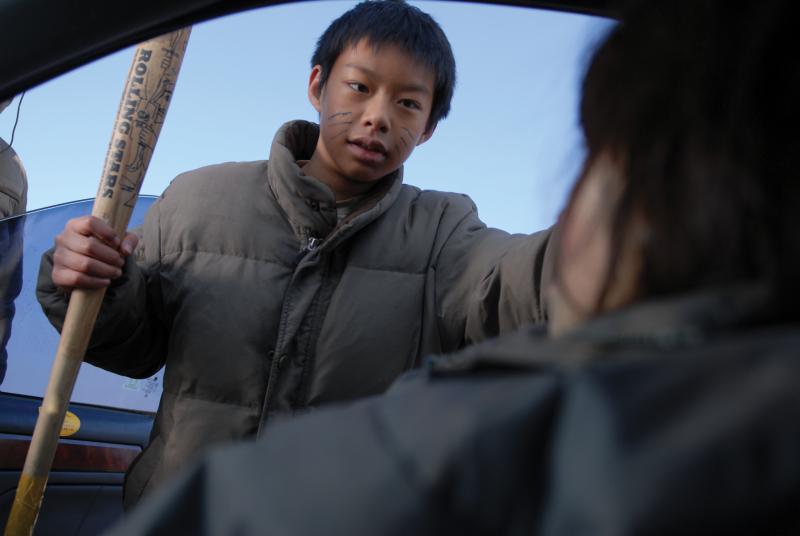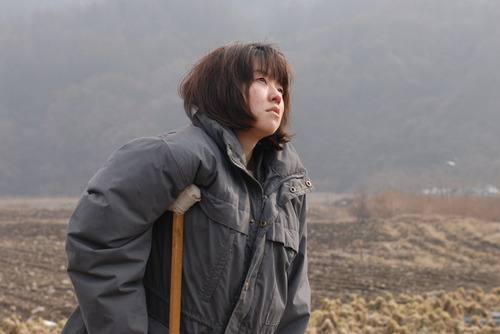
Tales of the apocalypse are often told in epic gravitas and loud explosions, yet a recent trend of filmmaking has searched for strategies to dig under our skin from a different angle. The Road tracked a relationship between father and son and focused on microcosmic details of their tragedy to expound on larger themes. Cause-and-effect logic is discarded in favour of keeping the narrative trigger a mystery, an attempt at keeping the story timeless as well as to seriously contemplate a real-life catastrophe – would we find out and, more importantly, understand the origins of such disasters if it were to happen to us? South Korea’s End of Animal certainly refuses to provide us with such an explanation, instead throwing its characters, and us, right into the centre of the maelstrom with little clues for us to navigate.
Soon-Yung, a pregnant woman, is traveling in a taxi across a deserted landscape, where they come across a lonely hitchhiker amid the barren wastelands. She kindly agrees to share the cab ride, but as they drive on, their conversation takes on an unexpected turn when it is revealed that the stranger knows the intimate details of both Soon-Yung and the driver’s lives. He warns that all electricity will be cut off in a matter of seconds and, lo and behold, the cab terminates and they experience a blackout. What follows suit is an anti-parable that abandons all takes on morality or faith yet faithfully mediates on those questions, never providing answers to only deepen our queries. Against all odds, Soon-Yung and the others must retain their animalistic urge to survive and quickly adapt to their newfound situation.
 Jo Sung-Hee marks out a moody sense of misanthropy for his debut feature, depicting violence through an atmosphere or a feeling rather than explicit imagery. The most brutal burden for his characters is not what they go through, though undeniably uncompromising that is, but the sheer fact that none of them have any idea what is going on. Every scene feels like the last for Soon-Yung, slowly sucking any energy for life out of her, yet she admirably perseveres despite the agonies. Her pregnancy and youthful appearance set up strong possibilities for sentimental flashbacks, but Jo Sung-Hee skillfully neglects these opportunities to instead revel in the impending doom. Narrative options, such as the couple in a stalled car, are suggested then abandoned, as the director is more interested in fixating on the immediate and trapping his characters on a perennially revolving wheel of misfortune.
Jo Sung-Hee marks out a moody sense of misanthropy for his debut feature, depicting violence through an atmosphere or a feeling rather than explicit imagery. The most brutal burden for his characters is not what they go through, though undeniably uncompromising that is, but the sheer fact that none of them have any idea what is going on. Every scene feels like the last for Soon-Yung, slowly sucking any energy for life out of her, yet she admirably perseveres despite the agonies. Her pregnancy and youthful appearance set up strong possibilities for sentimental flashbacks, but Jo Sung-Hee skillfully neglects these opportunities to instead revel in the impending doom. Narrative options, such as the couple in a stalled car, are suggested then abandoned, as the director is more interested in fixating on the immediate and trapping his characters on a perennially revolving wheel of misfortune.
The opening scene in the taxi, where the prophet seamlessly takes control of the dialogue and situation, is impeccably paced and skillfully edited. The faces of Sung-Lee and the driver, tightly framed in a compressed composition, gradually sink into confusion and despair as the antagonist progressively takes over. The pace of dialogue is perfectly calculated, as the delivery is speedy and difficult to keep up, especially where there is no visual support. The man is hidden behind his cap, back facing the camera and only his voice is clear, further adding to the perplexing tension that reminds us of the menacing twosome in Haneke’s Funny Games. With an unforgettable opening, End of Animal keeps the cold temperature throughout, never caving to clichés of its genre. So involved in the intensity, at no point were we given space to contemplate what we would do in a similar situation, yet the menace that pervades each frame will stay us as if we were in the cab with them.


